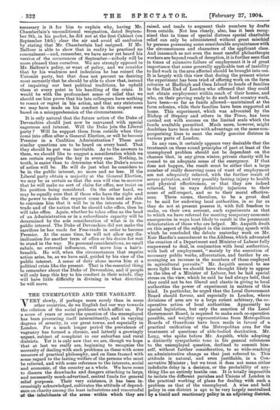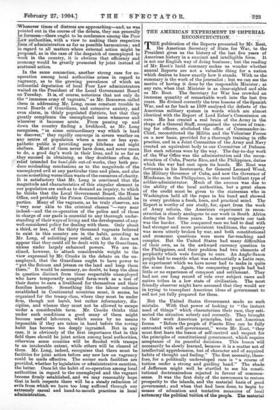THE UNEMPLOYED AND THE VAGRANT.
VERY slowly, if perhaps more surely than in some other countries, do we English feel our way towards the solution of the social problems which afflict us. For a score of years or more the question of the unemployed has been presenting itself intermittently, and in varying -degrees of severity, in our great towns, and especially in :London. For a much longer period the prevalence of vagrancy has formed a chronic, and latterly a growingly urgent, subject of complaint in our suburban and rural • districts. Yet it is only now that we are, though we hope that at last we really are, beginning to recognise the necessity of dealing with such problems as these with some measure of practical philosophy, and on lines framed with some regard to the lasting welfare of the persons who must be relieved, and with some reference to the interests, social ' and economic, of the country as a whole. We have come to discern the drawbacks and dangers attaching to large, and necessarily much-advertised, central funds for general relief purposes. Their very existence, it has been in- creasingly acknowledged, cultivates the attitude of depend- ence on charity among the least industrious and resourceful 'of the inhabitants of the areas- within which they are raised, and tends to augment their numbers by drafts from outside. Not less clearly, also, has it been recog- nised that in times of special distress special charitable relief can only be administered without great mischief by persons possessing some considerable acquaintance with the circumstances and characters of the applicant class. And inasmuch as not even the most careful philanthropic workers are beyond reach of deception, it is further seen that in times of extensive failure of employment it is of great importance that some generally applicable test of inability to find work in the area affected should be brought into use. It is largely with this view that during the present winter the experiment has been tried of offering work on the farm colonies at Hadleigh and Osea Island to heads of families in the East End of London who affirmed that they could not obtain employment within reach of their homes, and who, on their proving ready to do such hard country work, have been—so far as funds allowed—maintained at the farm colonies, while their families have been supported at home. This experiment, which was advocated by the Bishop of Stepney and others in the Times, has been carried out with success on the limited scale which the funds available permitted. Much more, however, might doubtless have been done with advantage on the same non- pauperising lines to meet the really genuine distress in various parts of London.
In any case, it certainly appears very desirable that the treatment on these sound principles of part at least of the unemployed problem should not be dependent on the chances that, in any given winter, private charity will be roused to an adequate sense of the emergency. If that does not happen, the result must be either that a large number of really deserving cases of want of employment are not adequately relieved, with the further result of severe privation, and very possibly lasting injury to health and physical effectiveness, or that they are indeed relieved, but in ways definitely injurious to their sense of self-respect, and so to their moral effective- ness. There seems, therefore, to be a great deal to be said for endowing local authorities, in so far as they do not at present possess it, with full freedom to make, on their own account, such experiments as that to which we have referred for meeting temporary economic emergencies in ways least likely to result in the permanent deterioration of those who are -helped. Mr. Asquith dwelt on this aspect of the subject in the interesting speech with which he concluded the debate yesterday week on Mr. Keir Hardie's amendment to the Address, which advocated the creation of a Department and Minister of Labour fully empowered to deal, in conjunction with local authorities, with lack of employment, "mainly by the execution of necessary public works, afforestation, and further by en- couraging an increase in the numbers of those employed in agricultural pursuits." Mr. Asquith seemed to see more light than we should have thought likely to appear in the idea of a Minister of Labour, but he laid special stress on the view, which he said he had always held, that they could not be too liberal and elastic in giving to local authorities the power of experiment in matters of this kind. In particular, he urged that the Local Government Board should favour, and especially in London, where divisions of area are to a large extent arbitrary, the co- operative action of local authorities. Apparently no special legislation, but only the sanction of the Local Government Board, is required to make such co-operation possible, and weighty representations from Metropolitan Boards of Guardians have been made in favour of a practical unification of the Metropolitan area for the treatment of questions of able-bodied destitution. Mr. Long, who spoke before Mr. Asquith, while adopting a distinctly sympathetic tone in his general references to the unemployed question, declined to commit him- self, without further consideration, to so wide-reaching an administrative change as that just referred to. This attitude is natural, and even Justifiable, in a Con- servative Minister ; but we trust it does not mean either indefinite delay in a decision, or the probability of any- thing like an entirely hostile one. It is totally impossible to isolate the different parishes and Unions of London in the practical working of plans for dealing with such a problem as that of the unemployed. A wise and bold policy in one district is apt to be verylargely neutralised by a timid and reactionary policy in an adjoining district, !Whenever times of distress are approaching—and, as was pointed out in the course of the debate, they can generally be foreseen—there ought to be conference among the Poor .Law authorities, with a view to making their respective lines of administration as far as possible harmonious; and in regard to all matters where external action might be .proposed, as in the case of the despatch of unemployed to work in the country, it is obvious that efficiency and economy would be greatly promoted by joint instead of scattered action.
In the same connection, another strong case for co- operation among local authorities arises in regard to vagrancy, as to the growing prevalence of which an influential deputation of local Poor Law administrators waited on the President of the Local Government Board on Tuesday. It is, of course, notorious that not only do the "immense army of vagrants," as Mr. Boscawen called them in addressing Mr. Long, cause constant trouble to rural Boards of Guardians, and extensive anxiety, and even alarm, in thinly populated districts, but that they greatly complicate the unemployed issue whenever and wherever it becomes acute. From passing up and down the country finding a livelihood, as Mr. Long recognises, "in some extraordinary way which is hard to discover," they rapidly converge in severe weather on any centre of population where a more or less sym- pathetic public is providing soup kitchens and night shelters. Most of them never have done, and never mean to do, a good day's work in their lives, and in so far as they succeed in obtaining, as they doubtless often do, relief intended for bond-fide out-of-works, they both pro- duce misleading conclusions as to the magnitude of the unemployed evil at any particular time and place, and also cause something worse than waste of the resources of charity. It is satisfactory that Mr. Long is convinced that the magnitude and characteristics of this singular element in our population are such as to demand an inquiry, to which he thinks that the Local Government Board, the Home Office, and probably the Prison Commissioners should be parties. Many of the vagrants, as he truly observes, are "very near akin to the criminal classes "—very near indeed—and the co-operation of the police and of those in charge of our gaols is essential to any thorough under- standing of their ways of living and the development of any well-considered policy for dealing with them. Only about a third, or less, of the thirty thousand a believed to exist in this country are in the habit, according to Mr. Long, of soliciting poor relief, so that it does not appear that they could all be dealt with by the Guardians, unless under largely enhanced powers. We are in- clined, however, to attach considerable weight to the view expressed by Mr. Crooks in the debate on the un- employed, that the Guardians ought to have power to "put the flotsam and jetsam on the land and keep them there." It would be necessary, no doubt, to keep the class in question distinct from those respectable unemployed who have temporarily accepted farm-work as a test of their desire to earn a livelihood for themselves and their families honestly. Something like the labour colonies established in Continental countries must, it seems, be organised for the tramp class, where they must be under firm, though not harsh, but rather reformatory, dis- cipline, and whence they must not be allowed to escape under a considerable term. Mr. Crooks thinks that under such conditions a good many of them might become useful labourers, which seems by no means impossible if they are taken in hand before the roving habit has become too deeply ingrained. But in any case, it is obviously of the first importance that in this field there should be joint action among local authorities, otherwise some counties will be flooded with tramps to an intolerable extent, while others will be cleared of them. Mr. Long, indeed, recognises that there must be facilities for joint action before any new law on vagrancy could be made effective. The sooner such facilities are provided, whether by legislation or administrative sanction, the better. Once let the habit of co-operation among local authorities in regard to the unemployed and the vagrant become firmly established, and we may reasonably hope that in both respects there will be a steady reduction of evils from which we have too long suffered through our extremely casual and hand-to-mouth practices in local administration.











































 Previous page
Previous page